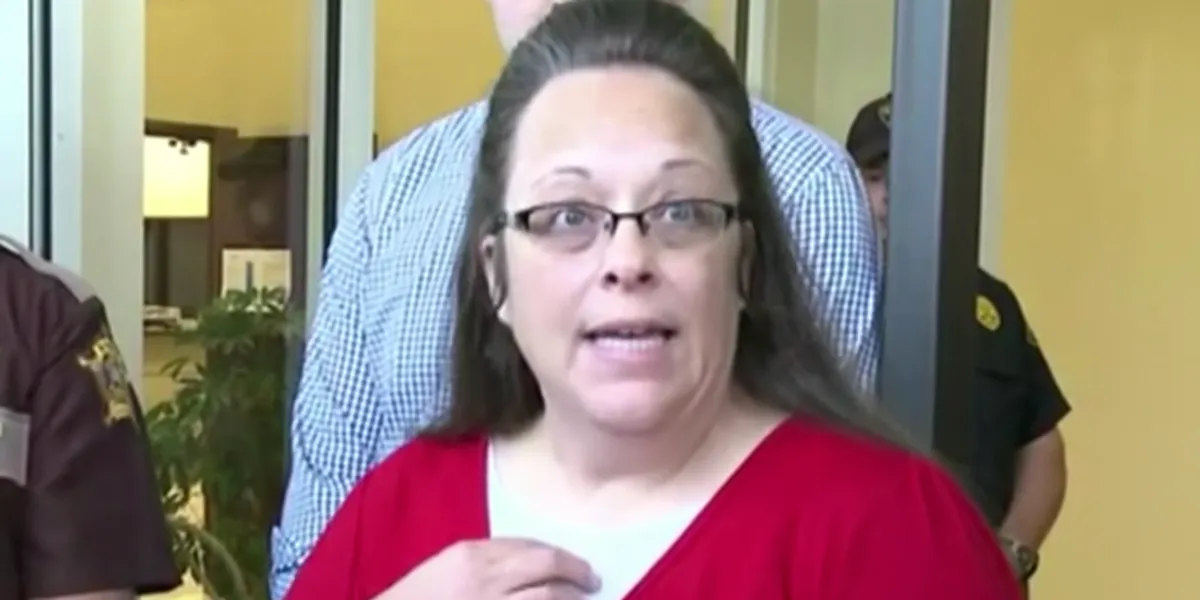Copyright alternet

The U.S. Supreme Court is set to meet behind closed doors this week, where it will consider whether to hear a petition filed by former Kentucky county clerk Kim Davis, who is urging the justices to overturn Obergefell v. Hodges, the 2015 landmark ruling that guaranteed same-sex couples the same legal rights and responsibilities of marriage as different-sex couples. Will the Court take up the case? Would they go so far as to overturn Obergefell? What happens if they do? The jury is out on the first two questions. Some experts believe the justices won’t take up Davis’s case at all, while others say they will, and see it as a vehicle to overturn marriage equality and toss it back to the states — which the Court did in Dobbs — removing the constitutional right to abortion. And what happens if they take it up, and take marriage rights from same-sex couples? Currently, there are 32 states across America that still have laws on their books limiting or banning same-sex marriage, according to Axios. Just 18 states, along with five territories and Washington, D.C., have no marriage equality bans, according to the Movement Advancement Project. MAP estimates that nearly half (47%) of all LGBTQ people in the U.S. live in areas where their state laws and constitutions ban same-sex marriage. The marriage bans could become law again should the Supreme Court overturn Obergefell. Like the SCOTUS decision that ignored precedent and “settled law” by striking down Roe v. Wade, those bans could spring back into action and become state law once again. State lawmakers have done little to overturn those same-sex marriage bans and enshrine the rights of same-sex couples into their state laws and constitutions as a backstop to the Supreme Court’s possibly impending decision to overturn Obergefell. Last month at Politico, Professor of Law Kimberly Wehle served up “5 Reasons the Supreme Court Might Change Its Mind on Same-Sex Marriage.” Wehle notes that the Court’s composition itself is far different than it was in 2015. There is a staunchly conservative 6-3 majority on the bench. Justice Clarence Thomas has called for a review of all “substantive due process” Supreme Court precedents on which Roe v. Wade was based. In his Dobbs concurring opinion, Thomas wrote: “in future cases, we should reconsider all of this Court’s substantive due process precedents, including Griswold [v. Connecticut], Lawrence [v. Texas], and Obergefell [v. Hodges]. Because any substantive due process decision is ‘demonstrably erroneous’ . . . , we have a duty to ‘correct the error’ established in those precedents.” Wehle also wrote that three justices who wrote strong opinions against same-sex marriage — Chief Justice John Roberts, Justice Clarence Thomas, and Justice Samuel Alito — remain on the bench. She notes that the Chief Justice wrote that “although the policy arguments for extending marriage to same-sex couples may be compelling, the legal arguments for requiring such an extension are not. The fundamental right to marry does not include a right to make a State change its definition of marriage.” Now, Kim Davis’s case needs just four justices to grant certiorari — a vote to take up the case. Legal scholars warn that Obergefell could face new scrutiny under the Court’s “history and tradition” test, a framework some consider highly controversial. Wehle also points to several recent cases that SCOTUS decided against the LGBTQ community. There are other issues underfoot that might bolster the Supreme Court’s decision-making process. The Texas state Supreme Court, for example, last week, ruled that judges may refuse to marry same-sex couples, merely citing their “sincerely held religious belief” against the practice. Longtime legal writer and commentator David Lat does not believe the Court will take up Davis’s case and overturn Obergefell, in part on technical grounds. Republican strategist David Urban, in a USA Today opinion piece last week, claimed, “Marriage equality isn’t in danger, but Democrats need you to stay afraid.” His reasoning? “Support for same-sex marriage is on the rise, including on the right.” Not according to a May Gallup poll, as NCRM reported at the time. Nearly nine in ten Democrats (88%) say marriages between same-sex couples should be recognized by law as valid, according to Gallup, but less than half that—just 41 percent—of Republicans agree. That’s a fourteen-point drop from the highest level recorded for right-wing voters, 55 percent, in 2021 and 2022. “The current 47-point gap between Republicans and Democrats is the largest since Gallup first began tracking this measure 29 years ago,” the polling firm reported. Asked whether they “personally believe that in general” gay or lesbian relations are “morally acceptable or morally wrong,” even fewer Republicans, just 38 percent, said they are morally acceptable. The national average is 64 percent, and the average among Democrats is 86 percent. Indeed, one of Wehle’s reasons same-sex marriage might be in trouble is that overturning the ruling would be good for Republican politics. “Overruling Obergefell could be good for the GOP, too,” she wrote. “With pivotal congressional midterm elections coming up, an opportunity to vote against LGBTQ+ rights could turn out a subset of far-right voters in red states who might otherwise stay home.” And she observed, the “threat of political pushback from the left has proven to be irrelevant to these justices.” Last week, MSNBC reviewed the Davis case, and noted that “since John Roberts became Chief Justice in 2005, the court has ruled in favor of religious organizations in 85% of the argued cases it heard.”



